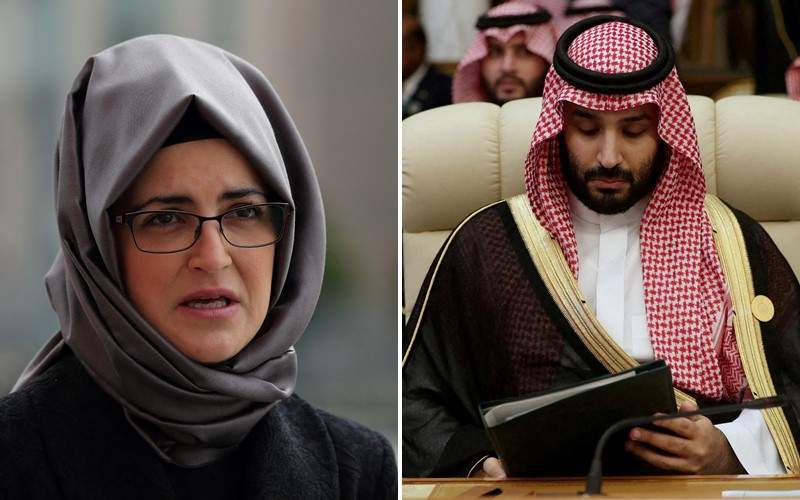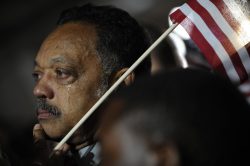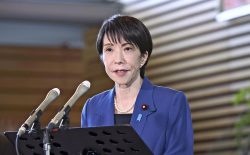
Left: Hatice Cengiz, fiancee of the murdered Saudi journalist Jamal Khashoggi, talks to Reuters outside Justice Palace, the Caglayan Courthouse, after attending a trial on the killing of Khashoggi at the Saudi Arabian Consulate, in Istanbul, Turkey April 7, 2022.
Right: Crown Prince of Saudi Arabia Mohammad bin Salman is seen during the Arab Summit in Mecca, Saudi Arabia, May 31, 2019.
16:51 JST, July 4, 2022
The Biden administration has until Aug. 1 to say whether it believes Saudi Crown Prince Mohammed bin Salman should be immune from a civil lawsuit filed against him in the United States by Hatice Cengiz, the fiancee of Jamal Khashoggi, a journalist who was murdered in 2018.
Cengiz and Democracy for the Arab World Now (DAWN), a human rights organization Khashoggi founded before his death, filed a lawsuit in 2020 against the crown prince and two dozen co-defendants. The suit alleges that Khashoggi was tortured, murdered and dismembered under the directives of the crown prince, who is often referred to by his initials, MBS.
The crown prince and two of the co-defendants have filed motions to dismiss Cengiz’s lawsuit, contending that the court lacks both subject matter jurisdiction and personal jurisdiction. The crown prince has previously denied ordering Khashoggi’s killing, and Saudi officials have blamed “rogue agents” for the journalist’s death.
The CIA concluded in 2018 that Mohammed had ordered Khashoggi’s killing, contradicting Saudi Arabia’s insistence that the crown prince had no advance knowledge of the plot.
U.S. District Court Judge John Bates said in an order on Friday that the U.S. government can submit a statement of interest regarding, among other things, “the applicability of head-of-state immunity in this case.” The Biden administration can also declare that it will not submit such a statement. If the United States does declare its interests, Mohammed and the other defendants will have until Aug. 16 to respond, Bates ruled.
Mohammed’s lawyers have argued that in the United States, the crown prince enjoys sovereign immunity in civil claims. Mohammed’s father, King Salman, is Saudi Arabia’s sovereign, though the crown prince is widely regarded as the kingdom’s day-to-day ruler.
The crown prince “has immunity not only from his immediate familial relationship to the King, but also from his own ‘high-ranking office,'” Mohammed’s lawyers argued in a motion to dismiss the lawsuit that was filed last year. Lawyers for Cengiz and DAWN have countered that courts have previously rejected claims that “de facto” leadership, by virtue of being crown prince, confers immunity.
The State Department typically consults with other U.S. government agencies before issuing a recommendation of immunity to the Justice Department, whose formal request is usually binding on a federal court. A decision can come quickly, such as for a head of state, or take months or years, depending on the circumstances and complexity of a case, legal analysts say.
“It would be a mistake as both a matter of law and policy for the court to grant MBS immunity, effectively guaranteeing impunity for this grotesque crime,” Sarah Leah Whitson, the executive director of DAWN, said in a text message.
The federal judge’s order comes just before President Joe Biden is scheduled to travel to Saudi Arabia later this month for the first time in his presidency, a trip that has made even some Democrats uneasy and that has prompted accusations of Biden flip-flopping on his promise to make Saudi Arabia a “pariah” after Khashoggi’s murder.
The Saudi Embassy touted the upcoming visit as one that would “enhance the historic and strategic partnership between the Kingdom of Saudi Arabia and the United States of America, as both countries aim to deepen and strengthen the existing areas of cooperation, and lay the foundations for the future of this strategic partnership.”
Khashoggi was killed Oct. 2, 2018, after visiting Saudi Arabia’s consulate in Istanbul to obtain documents that would allow him to marry Cengiz. In the months that preceded that visit, he had been writing columns for The Washington Post that were sharply critical of the crown prince, who effectively rules Saudi Arabia and has carried out a harsh crackdown on rivals and dissidents.
The journalist’s death and dismemberment was first revealed by Turkey’s government. The killing set off a wave of international revulsion and calls to ostracize Saudi leadership.
A separate attempt to prosecute Khashoggi’s murder, in Turkey, ended recently after the government of Turkish President Recep Tayyip Erdogan ended its trial of suspected members of the Saudi team that killed the journalist in the kingdom’s Istanbul consulate. The suspects, who were all in Saudi Arabia, were being tried in absentia.
Turkey’s suspension of the trial in April, coincided with an effort by Erdogan’s government to restore relations with the kingdom that were ruptured after Khashoggi’s slaying.
“We will look for justice in the United States,” Cengiz said at the time, referring to the Turkish decision, and her U.S. lawsuit.
Top Articles in News Services
-

Prudential Life Expected to Face Inspection over Fraud
-

Hong Kong Ex-Publisher Jimmy Lai’s Sentence Raises International Outcry as China Defends It
-

Japan’s Nikkei Stock Average Touches 58,000 as Yen, Jgbs Rally on Election Fallout (UPDATE 1)
-

Trump Names Former Federal Reserve Governor Warsh as the Next Fed Chair, Replacing Powell
-

Survey Shows False Election Info Perceived as True
JN ACCESS RANKING
-

Japan PM Takaichi’s Cabinet Resigns en Masse
-

Japan Institute to Use Domestic Commercial Optical Lattice Clock to Set Japan Standard Time
-

Israeli Ambassador to Japan Speaks about Japan’s Role in the Reconstruction of Gaza
-

Man Infected with Measles May Have Come in Contact with Many People in Tokyo, Went to Store, Restaurant Around When Symptoms Emerged
-

Prudential Life Insurance Plans to Fully Compensate for Damages Caused by Fraudulent Actions Without Waiting for Third-Party Committee Review




















